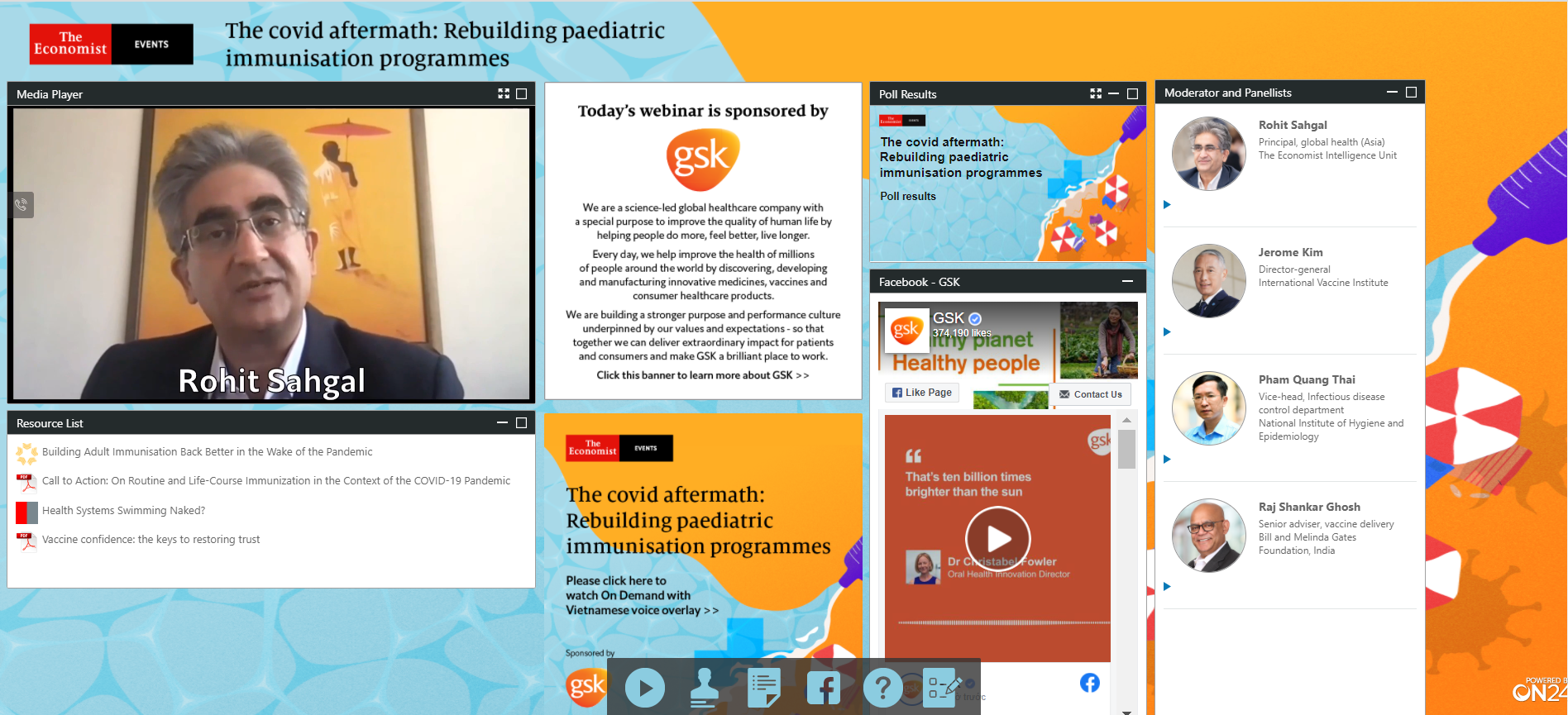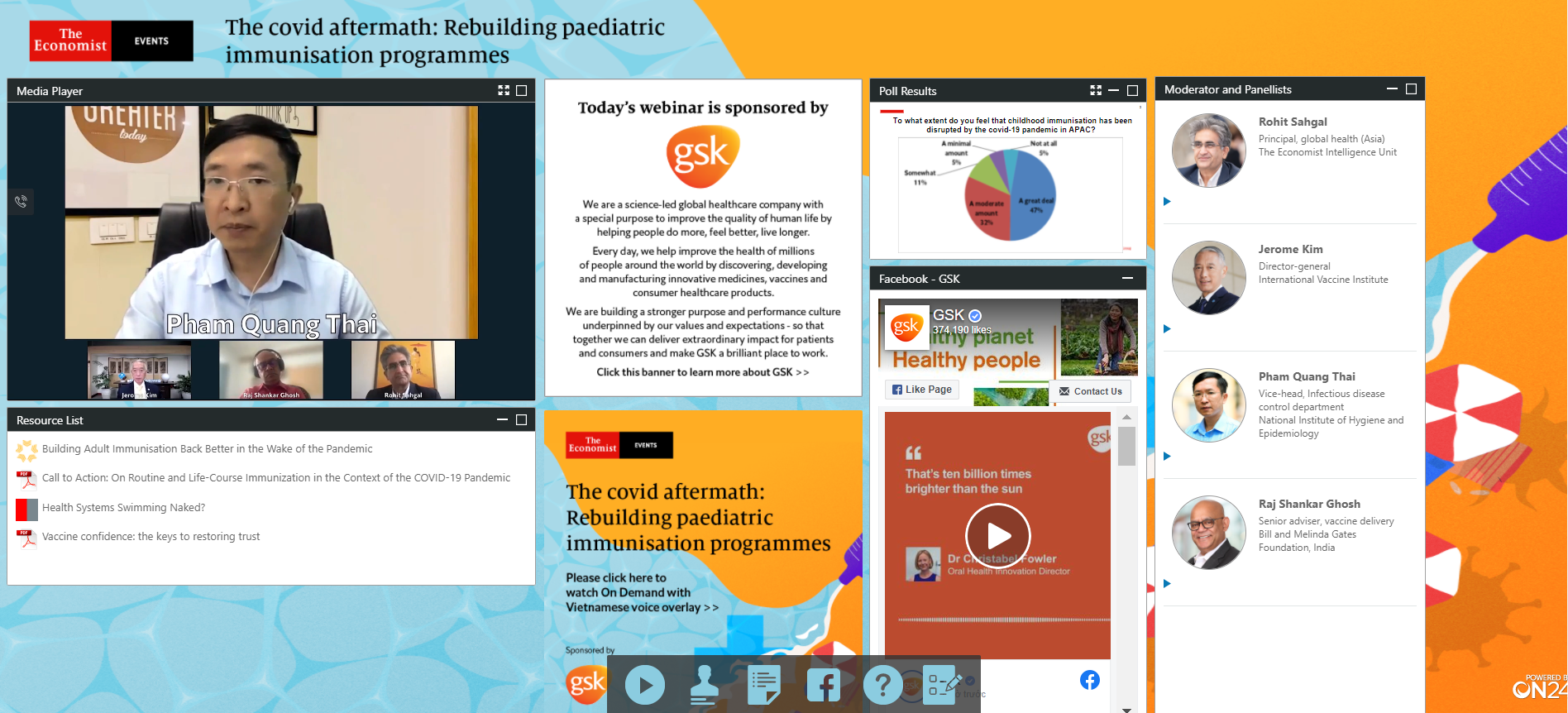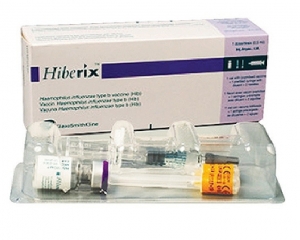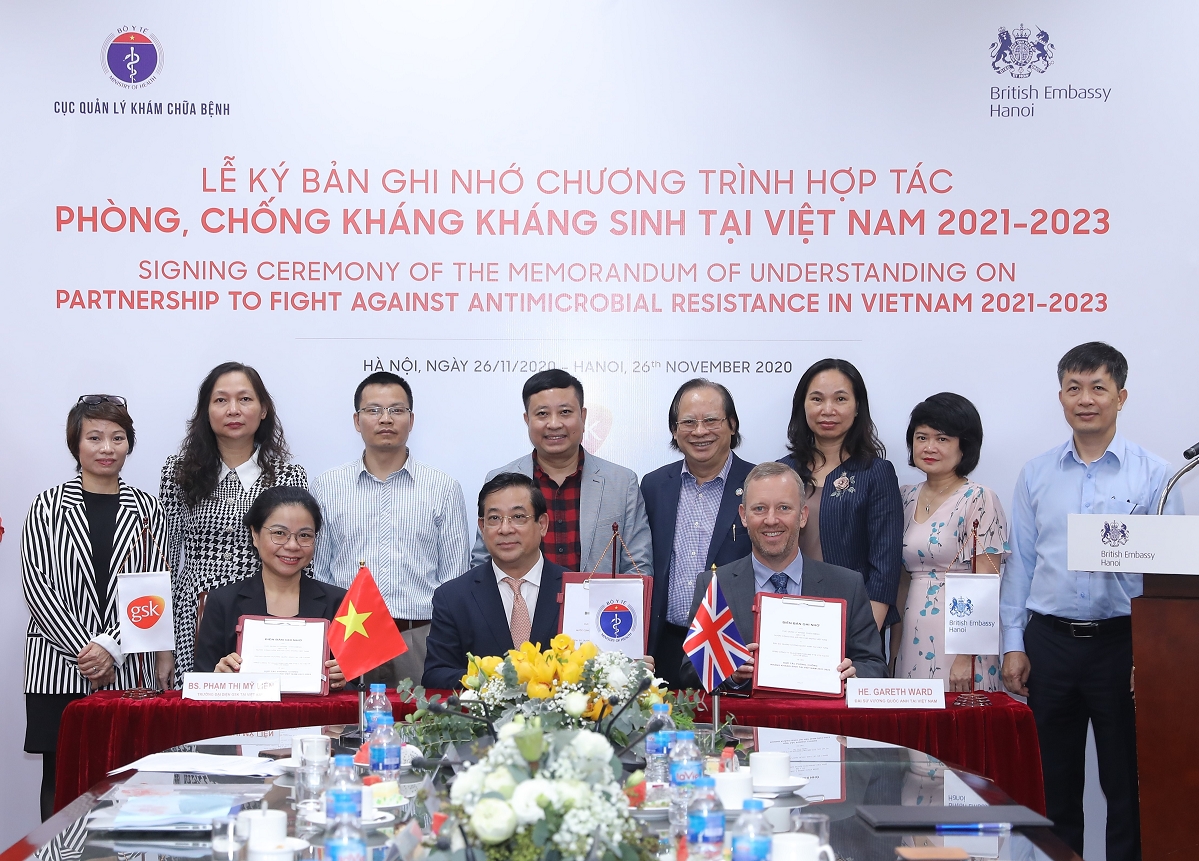Post COVID-19: Burden doubles as childhood immunisations are disrupted
 |
| The virtual scientific conference on re-establishing immunisation programmes |
The Economist in collaboration with GSK has organised a virtual scientific conference with the theme: "COVID-19 Aftermath: re-establishing immunisation programmes for children". The seminar was moderated by Rohit Sahgal, health expert in Asia, Economist magazine along with key external experts such as Dr. Jerome Kim, general director, International Vaccine Institute; Dr. Raj Shankar Ghosh, senior advisor on Vaccines, Bill and Melinda Gates Foundation; Dr. Pham Quang Thai, deputy head of Epidemiology Department, National Institute of Hygiene and Epidemiology.
23 million children around the world missed out on basic and essential vaccines in 2020
Health experts discussed the importance of maintaining immunisation programmes for young children globally, especially during COVID-19. According to figures from the United Nations Children's Fund (UNICEF) and the World Health Organization (WHO), due to the impact of the COVID-19 pandemic, up to 23 million children have missed out on essential vaccines in 2020. This is an alarming number and needs the attention of policymakers, health systems, and society as a whole, and most importantly, it reminds us that we need to act immediately.
According to research by The Economist, in Argentina, Brazil, and Mexico, only three-quarters of infants are vaccinated with basic vaccines in 2020. In India, statistics up to May 2020 show that the vaccine preventive care for children here has decreased to 60-70 per cent. Vietnam controlled COVID-19 quite well last year, so more than 90 per cent of infants are immunised and protected with basic vaccines. However, from April 2021, Vietnam faces a bigger challenge after being heavily affected by the Delta variant, many provinces and cities have to carry out lockdowns and the vaccination programme may be put on hold.
It is also important to note the achievements that Vietnam's vaccination programme has achieved in recent years, even when compared with other developed countries such as Brazil or India. This is the foundation to help Vietnam's immunisation programmes perform even better in the future. One of the aspects that need attention in the near future, according to Dr. Pham Quang Thai, deputy head of the Department of Epidemiology, National Institute of Hygiene and Epidemiology, is: "We need to consider the whooping cough vaccination for pregnant women to help infants receive antibodies right from the time they are in the womb. The reason is that from 2011 to 2019, we saw a 10-fold increase in the incidence of pertussis, from 0.1 to 1.06 per 100,000 population, according to the Report Summary of the Vietnam Expanded Immunization Program in 2019."
Dr. Thai emphasised that most of this burden occurred in infants younger than three months of age, before they were fully protected by 5-in-1 or 6-in-1 vaccines. Immunisation strategies for pregnant women could be a potential solution.
Early interventions help Vietnam reduce future burdens due to COVID-19
Lessons learned from other countries will help Vietnam plan early action to prevent disruptions to childhood immunisation programmes caused by the COVID-19 pandemic, reducing risks and burdens on children.
 |
| Participants discussed at the virtual scientific conference |
Dr. Pham Quang Thai added, “Right after lockdown, one of Vietnam's top priorities is to embark on a plan to restore the operation of the vaccination programme while ensuring epidemic prevention and control measures, ensuring the safety of medical staff, health professionals, and the community. In addition, we need to prepare resources and balance the budget so that we can continue to put more vaccines recommended by the WHO into the National Expanded Immunization Program.”
In addition to timely communication about COVID-19, the media plays an extremely important role in continuing to raise awareness about infectious diseases and the burden they cause, thereby helping the public understand more about the importance of immunisation, which has become more well known after this pandemic. Working together to help Vietnam achieve dual goals, which is to not only control COVID-19 but also life-threatening diseases that can be prevented by vaccines at the same time.
Parents need to learn more about their child's immunisation plan earlier on and consult a doctor so that their child does not miss any important vaccines by the time they are six weeks old, such as the 6-in-1 vaccine, vaccines against diarrhoea caused by rotavirus, as well as vaccines against dangerous diseases caused by pneumococcal bacteria such as meningitis, pneumonia, among others.
There have been many lessons in the past, and even with the COVID-19 pandemic, we all need to be reminded of how vaccines help protect people from diseases. For diseases that have been eradicated by vaccination, there is no reason why we should see deaths from vaccine-preventable infectious diseases, especially in young children.
| The collaboration of GSK and The Economist GSK partnered with The Economist to study and provide an overview of the impact of COVID-19 on vaccination programmes and practices in several countries such as Argentina, Brazil, Mexico, India, and Vietnam. This study assesses several aspects such as access to immunisation services, existing immunisation patterns, influencing factors and recent disruptions to childhood immunisation programmes in different emerging markets mentioned above. The objective of the study was to help provide Vietnam with context around the potential impacts of disrupting immunisation programmes through best practices and experiences from countries affected by COVID-19 the previous year. From there, Vietnam can implement early intervention measures to prevent vaccination disruptions due to the COVID-19 pandemic to minimise the impact on health as well as the impact on the socio-economic situation in the future. GSK is a science-led global healthcare company with a special purpose: to help people do more, feel better, live longer. GSK is the leading manufacturer of vaccines globally. |
| Partnership signed to fight against antimicrobial resistance in Vietnam in 2021-2023 |
What the stars mean:
★ Poor ★ ★ Promising ★★★ Good ★★★★ Very good ★★★★★ Exceptional
Themes: Healthcare Platform
- PM outlines new tasks for healthcare sector
- Opella and Long Chau join forces to enhance digestive and bone health
- Hanoi intensifies airport monitoring amid Nipah disease risks
- Cosmetics rules set for overhaul under draft decree
- Policy obstacles being addressed in drug licensing and renewal
Related Contents
Latest News
More News
- Vietnam Television launches third 'Song Sau Lu' project for 2025 (December 15, 2025 | 08:00)
- Closing workshop highlights five-year impact of Fair for All project (December 12, 2025 | 16:22)
- Stakeholders mobilised before new child safety rules take effect (December 10, 2025 | 09:00)
- Vietnam receives emergency international relief as regional flooding intensifies (December 04, 2025 | 15:11)
- AmCham scholarships awarded to students (December 02, 2025 | 16:46)
- Vietjet flights carry love to devastated central region (November 28, 2025 | 11:35)
- SCG Sharing the Dream supports Vietnam’s youth and sustainable development goals (November 28, 2025 | 10:55)
- Siemens Caring Hands donates $34,700 for disaster relief in Vietnam (November 26, 2025 | 20:25)
- Ireland extends support for the Resilience First initiative (November 26, 2025 | 15:24)
- South Korea funds IOM relief for Vietnam’s typhoon-affected communities (November 24, 2025 | 15:33)




 Tag:
Tag:
























 Mobile Version
Mobile Version